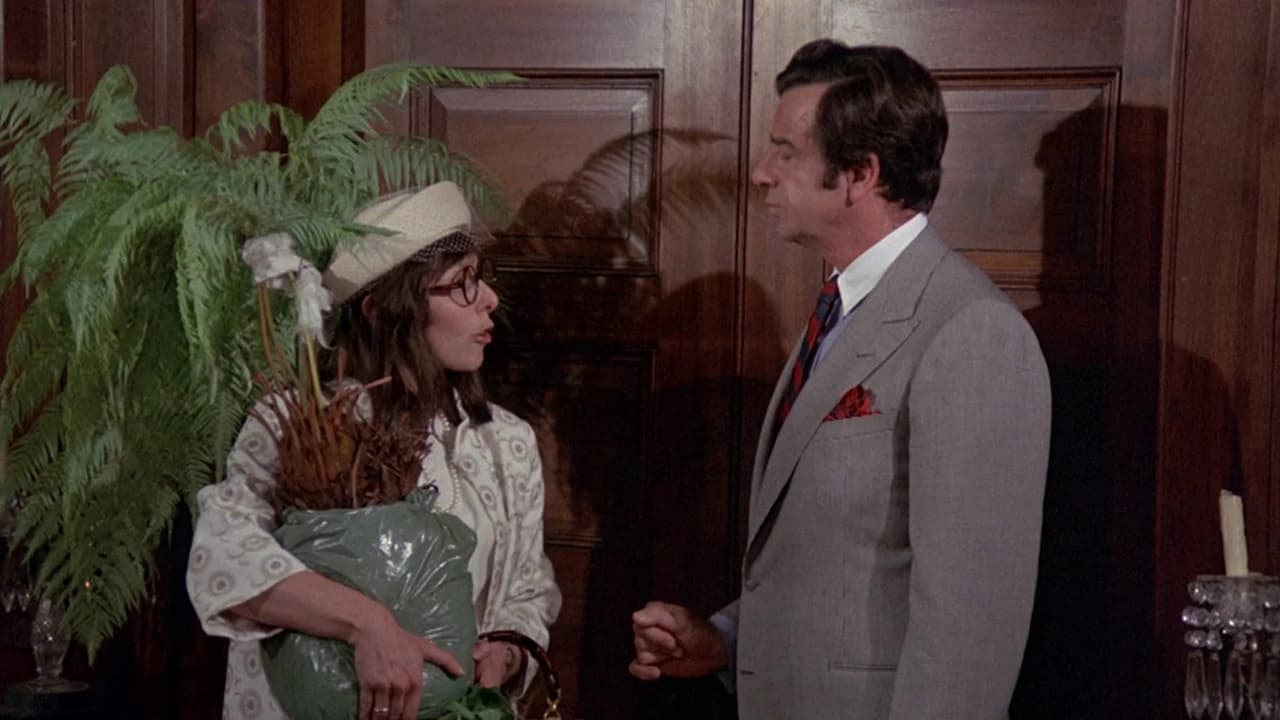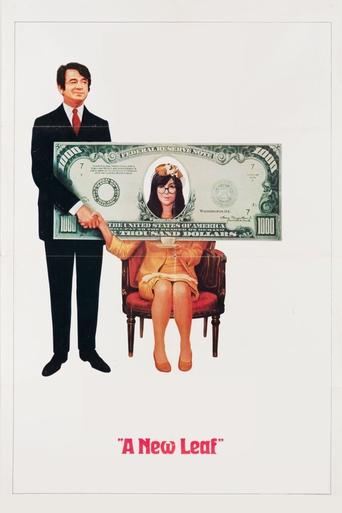BroadcastChic
Excellent, a Must See
Ketrivie
It isn't all that great, actually. Really cheesy and very predicable of how certain scenes are gonna turn play out. However, I guess that's the charm of it all, because I would consider this one of my guilty pleasures.
PiraBit
if their story seems completely bonkers, almost like a feverish work of fiction, you ain't heard nothing yet.
InformationRap
This is one of the few movies I've ever seen where the whole audience broke into spontaneous, loud applause a third of the way in.
SimonJack
Henry Graham has "no skills, no resources, no ambition. All I am, or was," he says to his valet, "is rich, and that's all I ever wanted to be. I don't understand, Harold. Why did it happen to me? Why? I was so happy. What will I do?"Those lines from "A New Leaf" are a picture of what Henry Graham's life was like up to now. He's single but he isn't a playboy or a homosexual. If anything, he's a misogynist. He's a man who enjoys manly sports, thrills and action – cost and other people be damned. Walter Matthau plays the egocentric Graham to perfection. He's a self-centered, snob and hedonist whose behavior is sardonic to all around him. His character is exaggerated to the point of ridiculousness. He lives in a New York City apartment but owns a Ferrari. He can't drive the super sports car more than twice a week, so it's always carboned up and in the shop for repairs. But "it's worth it," he tells a mechanic. He owns a plane but doesn't fly it often enough. So it has the same problems -- carbon. He owns a horse and plays polo. He eats in the best restaurants and enjoys fancy wine. In short, he's on a pleasure trip, but he owns so much and has so many things that he can't use them often. And he says, or thinks that he's happy. Fifteen years earlier, Henry came of age and out from under his uncle's guardianship. He told his attorney and financial manager that he wanted to live on an income of $200,000 per year. But he doesn't have a job or own a business. His lifestyle is based on his inheritance earnings of $90,000 per year. Now the money has run out, all his investments are sold, and he's broke. There's only one way to escape poverty and the humiliation of it. As his valet, Harold, explains, it's "what any gentleman in similar circumstances would do – marry." It's presumed into wealth, of course. George Rose is Henry's valet, Harold. He encourages Henry in his hunt for a wife. Harold says he would find it hard to find work elsewhere as a gentleman's gentleman. He says to Henry, "You have managed in your lifetime, Mr. Graham, to keep alive traditions that were dead before you were born." The films is loaded with such wit and funny lines throughout. Most of it comes in the acerbic lines of Henry, especially toward servants, and those people "below" him. Enter Elaine May, who also wrote the screenplay for the film. She plays wealthy heiress Henrietta Lowell. She's the perfect candidate – after Henry has dated some others whom he couldn't tolerate. But the shy, clumsy, amiable and amicable Henrietta is the perfect spouse for Henry's future plans. The rest of the story unfolds as Henry courts Henrietta and they get married. Great humor comes in the form of Henrietta's attorney, Andy McPherson, and a slew of consorts who are sponging off the good- hearted and naïve Henrietta. Jack Weston is superb as McPherson and provides some of the most hilarious scenes in his groveling and begging Henrietta to marry him instead of Henry. Doris Roberts heads the household cast as Mrs. Traggert, and she and the rest of the cast are a hoot. James Coco is hilarious as Uncle Harry. Of course, Henry can see through these slouches, incompetents and con artists. And he's the biggest one of all in this film. Harold discovers the household books, hidden under Mrs. Traggert's mattress. Traggert and company have been bilking Henrietta for years. Henry takes charge of the household, fires the lot and hires new competent help. The rest of the story shows Henry looking for a way to dispose of his wife – by an accident, of course. But as it develops, Harold tells Henry that he has changed, that he has many skills, and that Mrs. Graham is a very good partner. Still, Henry says, almost in a tantrum, "I don't want to share things. I want to own them all by myself." Henrietta's naiveté and innocence begin to work on Henry, He gradually becomes more patient and kind toward her. I won't describe all the details that lead to his final change of heart. But when Henrietta names a new fern she discovers after Henry, we see the spark of humanity begin to glow in Henry. This is a great comic tale of wasted youth, hedonism, and self-centeredness that ends with redemption. Very clever writing, directing, editing and musical scoring went into this film. It's a most entertaining movie with a great moral – although those just looking for entertainment may miss the latter. It is very cleverly interwoven in this beautiful and very funny film. It's certainly one of the very best films about a person turning over a new leaf. Here's one very funny scene in the film. At a fancy restaurant, Henry picks out a wine and says to Henrietta that the '55 Mouton Rothschild was an excellent wine. Henrietta then tells him she didn't drink much, but her favorite wine comes from a drink she had the previous year on a botanical field trip to the Caribbean. A friend introduced her to Mogen David extra heavy Malaga wine with soda and lime juice. "It tastes a little like grapefruit juice, and every year is good," Henrietta says. "It's called a Malaga cooler." I don't know how either actor could keep a straight face in this scene. What a great, funny and satisfying movie!
JLRMovieReviews
Walter Matthau has been living high on the hog and used to the extravagant life, due to his wealth left to him, but one day he finds it's all gone. It has come to his attention through his accountant that he is broke and that he has innumerable debts. He must liquidate. He must do something. That something, as he discusses and decides with his man, is to marry for money. Enter Elaine May, who is ideal, because she is eccentric, lonely, kind of naïve and unsuspecting, and plain but not too plain. Oh, and she's very, very rich. In his wooing her, they have adventures together, but mainly talking about her hobby of gardening and discovering new flowers. She loves flowers. He also finds that her staff has been taking advantage of her, because she is very gullible. People tend to take advantage of her sweet nature. Huh? It turns out that Walter has finally found some good use for himself in taking care of her and her financial business. He finally finds some self-worth in thinking of someone besides himself. Her sweet disposition, their chemistry together and the great ending really make the film. It is now my favorite "new film I've discovered." Elaine May wrote and directed this film and I loved all of it. The beginning is a bit confusing, but, if you can get past the first 5 minutes or so, I think you'll love it too. This really is a treasure ready to be unearthed. Find yourself "a new leaf" today and you'll have a new perspective on life.
vincentlynch-moonoi
Recently I've caught a number of Walter Matthau films on cable. Matthau was long a favorite of mine since I first really noticed him as more than a character actor (which was probably when my mother and I went to see "The Odd Couple", which doesn't seem quite so funny now, but had us in stitches back in 1968). Seeing some of Matthau's old films recently reminded me of just how good he was, after taking him for granted for so many years. He could do character roles (as most of his early career was; and many were impressive) or starring roles. He could do drama (such as "First Monday In October") or comedy.This particular film -- "A New Leaf" -- is one of Matthau's best. Certainly, as with almost any film, more than one actor could play the starring role. But Matthau had a certain persona which allowed him to make this role in this film his own. Had anyone else been the star, it would have been a VERY different film. What Matthau could do with dead pan was amazing. The early scenes in this movie, where Matthau's character learns that he is dead broke are just hilarious. Hilarious writing, to be sure, but also hilarious because of that Matthau persona. I can't think of another actor who could have handled those scenes in that way. Yes, Matthau was relatively unique...and that's why we liked him so much as to make him a major star in an everyday body.And that's true about this film, too. It's interesting to read the Wikipedia article about the film, which was Elaine May's creation. Thankfully, the big bosses at Paramount didn't allow her to have her way with the final film. Would we really want to sit through 3 hours of a film in which Matthau actually becomes a murderer? I don't think so...and neither did Matthau. May's version would have justified murder (which isn't usually very funny), while this version shows redemption (of both main characters, though mostly of Matthau's character). But what is good about this film is that it doesn't seem to be a rehash of a lot of other films. Like Matthau's performance, the film is relatively unique. Oddly enough, as widely respected as the film was at the time (in terms of reviewers), it was not very successful at the box office. Yet, I still see it as a gem.In addition to Walter Matthau, the movie also stars Elaine May in as good a role as she ever had on the big screen. I always saw May as a "niche" actress, and this is her niche. It was nice to see an actor -- James Coco -- who I had pretty much forgotten about; he's funny here. George Rose is excellent here as the butler. Jack Weston -- one of those character actors who usually played pretty much the same part -- is perfect here as the shady lawyer. And, it's interesting to see a relatively young Doris Roberts, although her part is not large.I'm quite enamored with this film, although it still only get's my "7" for being a very watchable and enjoyable film. But I highly recommend it.
laura-6
For some of us, the only recent recording of this film came from either TCM or PBS (can't remember which), wherein the sound sync was off kilter. Also, some images were fuzzy. The print shown on SHO(W)is crisp and in sync. That has to do for those of us who await a DVD with Ms. May's comments -- we hope.This is a drolly funny film with great location shots in New York City, parts of Long Island, NY as well as Maine. The line that will live forever for me is this: "And she has to be vacuumed every time she eats!" What a gem of a film.

